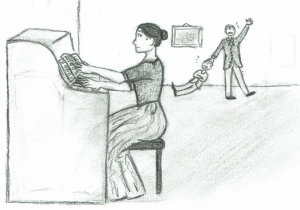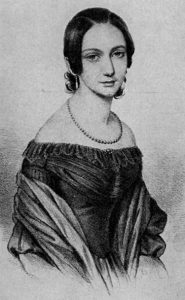
If you’ve ever read The Gulag Archipelago, you probably remember the story where nobody wanted to be the first to stop clapping for Comrade Stalin:
The applause went on—six, seven, eight minutes! They were done for! […] They couldn’t stop now till they collapsed with heart attacks! […] Nine minutes! Ten!…Insanity! To the last man! With make-believe enthusiasm on their faces, looking at each other with faint hope, the district leaders were just going to go on and on applauding till they fell where they stood, till they were carried out of the hall on stretchers.
The one who finally had the nerve to sit down first after 11 minutes was sent to the Gulag, of course. But what interests me about this passage right now is that 11 minutes seemed like an insane amount of applause to all involved.
Think about that, and then consider: at a concert she gave on February 27, 1837 in Berlin, Clara Wieck got an hour and half of thunderous applause.
An hour and a half! That’s the time it takes to watch a full-length film, and Clara Wieck made people want to spend it banging their hands together. That’s how good she was.
In Clara Schumann, The Artist and the Woman, Nancy B. Reich explains how she became one of the greatest pianists of the 19th century. Her father, the piano teacher Friedrich Wieck, zeroed in on her as the most talented of his children and dedicated his life to making her a great musician and a star.
Here are the things Clara Wieck was allowed to do as a child:
- Play the piano
- Take long walks
- Eat
- Sleep
I guess we can also include “write in her diary,” although often it was her father who did so – in her voice. “Father arrived by express coach at seven in the evening,” he wrote in one entry, “I flew into his arms and took him right to the Hotel Stadt Frankfurt.” Wieck was so possessive about his daughter’s childhood diaries that she was forty years old by the time he agreed to relinquish them to her.
Wieck was not only possessive and controlling but also fierce – Robert Schumann once visited his home to find him dragging one of Clara’s younger brothers around by the hair as a punishment for substandard violin playing. “Am I among humans?” wondered Robert in his own diary.

So, given a range of options, most of us wouldn’t choose Friedrich Wieck as a dad. To be fair, though, by applying his merciless training to her natural aptitude, he did succeed in making Clara a musician of the highest order. Hence the hour and a half of applause.
Unsurprisingly, Wieck was loath to allow any other man to take his Clara away and hated Robert Schumann with a passion (he also ended up hating the guy he invited over to distract her from Robert Schumann). Clara and Robert had to sue him for permission to marry; Wieck submitted a statement to the court to the effect that Robert “could not help Clara with her career since he was socially inept […]; that he crippled his finger through his own stupidity; that he lied about his income; that he had been badly brought up and displayed an indescribable egotism and unlimited vanity; that he was a solitary drinker and drank to excess, and that he did not really love Clara – he wanted to use her for his own purposes and live off the money she earned as an artist.”
Also interesting is his assertion that Clara, “having been trained as an artist, was unfit to run a home.” This reminds me of Piero Melograni’s biography of Mozart, where he argues that the popular conception of Mozart as practically incapable of functioning in society (cf. Amadeus) comes from his family’s attempt to convince themselves and anyone who would listen that he couldn’t get along without them. Perhaps it’s always that way with child prodigies.

This book gives a thorough account of Clara as a musician, teacher, and composer. It also includes juicy gossip, like what a dead weight of a husband Robert eventually became with his mercurial (literally?) moods and inability to handle….anything, really, before he finally broke with reality altogether (Wieck wasn’t entirely wrong about him); or everything you ever wanted to know about Clara and Brahms. Peter Schickele’s Interear Telecommuniculture Phone ™ sketch, where the dial-up request for a Schumann symphony includes the option, “If you would like to hear this piece as the composer would have written it if he had known that Brahms had the hots for his wife, press 3,” left teenage me with the impression that this was a long-simmering love triangle. But Brahms only met Robert and Clara about 6 months before Robert attempted suicide and went to live in a padded room.
Brahms was there with Clara when Robert died two years later. They had a deep and fruitful relationship and he probably was in love with her, although he was probably also in love with her daughter Julie. Life is complicated.
Anyway, this book is well researched and well written, and it’s still in print, so there’s no excuse for you not to read it. You can also listen to this:
I know that piano at the top!
No doubt a great musician (insofar as we can tell, since she lived before recordings), but I look at these applause stories skeptically. Was anyone really timing it, or did it just seem that long?
You may be right, but the important thing as far as her dad was concerned was that she got more applause than Paganini.